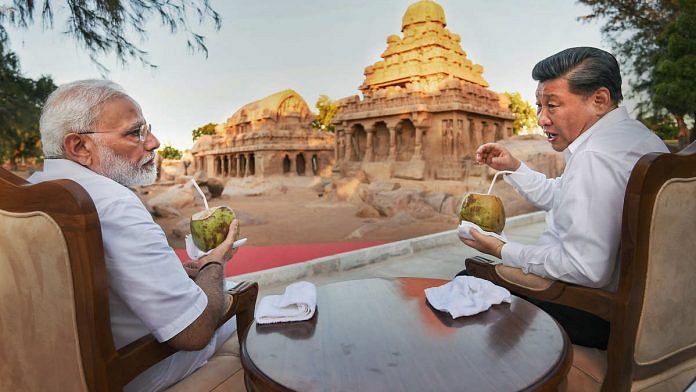Mamallapuram: Expansion of two-way trade was the biggest takeaway from the first day of the informal summit between Prime Minister Narendra Modi and Chinese President Xi Jinping as both leaders visited monuments and sipped coconut water together in the ancient town of Mamallapuram. The leaders also discussed combating terrorism and radicalisation, said Foreign Secretary Vijay Gokhale, adding that the discussion will continue Saturday.
Sources said while the issue of terrorism and radicalisation was discussed Friday, the Chinese side will raise the issue of Kashmir and the scrapping of Article 370 when the meeting resumes Saturday.
“There was discussion on trade and how to increase trade value and trade volume… There was also discussion on trade deficit and trade imbalance that exists,” Gokhale said Friday evening as the first day of the informal summit came to a close.
The trade deficit between India and China stands at $53.56 billion out of a two-way trade of $87 billion. While New Delhi remains concerned on ways to narrow the widening trade deficit between the two, Beijing is desperate to make Modi sign the mega free-trade pact Regional Comprehensive Economic Partnership (RCEP).
‘Quality time’
The foreign secretary also said Modi and Xi spent five hours of “quality time” on the discussion, and spoke at great length about enhancing knowledge of the ancient trading links between India and China.
The discussion over dinner went “well beyond the planned time”, and both leaders had detailed discussions on their national visions, governance priorities, economic development and deepening of ties, Gokhale said.
Raveesh Kumar, spokesperson for the Ministry of External Affairs, added in a tweet: “Concluding a highly productive day with a pleasant conversation over a long dinner PM @narendramodi & Chinese President Xi continued their exchange of views on deepening of the India-China partnership over a breathtaking Kalakshetra cultural performance followed by dinner.”
Concluding a highly productive day with a pleasant conversation over a long dinner
PM @narendramodi & Chinese President Xi continued their exchange of views on deepening of the India-China partnership over a breathtaking Kalakshetra cultural performance followed by dinner. pic.twitter.com/bDwiFOX450
— Anurag Srivastava (@MEAIndia) October 11, 2019
Also read: Modi and Xi are unequal leaders who won’t tango in Mamallapuram but size each other up
Coconut water & veshti
Earlier in the day, the two leaders went around three Mamallapuram monuments — Arjuna’s Penance, Panch Rathas and Shore Temple — that are all UNESCO world heritage sites.
At the Panch Rathas monument, while sipping coconut water, Modi and Xi reminded the world once again that despite differences over a host of issues, including an unsettled border dispute, their countries have never fired at each other since the 1962 Sino-India War.
This was followed by a cultural show and a gala dinner reception at the Shore Temple.
“Moving in unison … PM @narendramodi & Chinese President Xi have a quiet conversation at the ‘five chariots’ at #Mamallapuram,” Kumar said in another tweet.
Moving in unison
PM @narendramodi & Chinese President Xi have a quiet conversation at the ‘five chariots’ at #Mamallapuram. The monuments resemble processional chariots of a temple and are hewn out of solid rock to form five free-standing monolith temples.#ChennaiConnect pic.twitter.com/QIkChzjW8V
— Anurag Srivastava (@MEAIndia) October 11, 2019
Modi, who was dressed in traditional Tamil attire of veshti and angavastra, also gifted Xi a traditional lamp called ‘Nachiarkoil’ and a Thanjavur painting of ‘Dancing Saraswathi’.
However, the hard talk between the two leaders will begin Saturday when they sit for a one-on-one meeting at the luxurious Taj Fisherman’s Cove Resort, while delegation-level talks continue on the sidelines.
Expected outcomes
One of the major outcomes expected from this summit is likely to be the establishment of a hotline between the two foreign ministries, in an effort to establish regular contact, sources told ThePrint.
The hotline will be part of a larger plan to expand the confidence-building measures between both the countries.
China may also offer relaxation in tourist and professional visas, as well as allowing more and more Indian doctors, journalists, architects and others to explore employment opportunities in that country, sources said.
An immediate consequence of the summit may be India signing the much-awaited RCEP, which is led by the 10-member ASEAN grouping.
Another expectation is that the leaders could direct their special representatives for border talks to hold the next round of talks. The talks were scheduled to be held in August, but got postponed after India scrapped the special status of Jammu and Kashmir.
Also read: Modi & Xi don’t need to sign a dozen trade pacts to make second informal summit a success




Without China’s tacit support to pakistan, it’ll not possible for Pakistan to continue directing terrorism against India. China is unlikely to dump Pakistan. Unless Modi is able to do a miracle, China will continue to use Pakistan against India. I think deeping and enlarging of India’s trade relations with China will create the primary conditions for China to change it’s positions on Pakistan. I am sure Modi is working on an strategy to isolate Pakistan from China.
The convergences and shared interests are in economic engagement. China should open its markets a lot more to India. Equally, our economy should rebuild its export momentum.